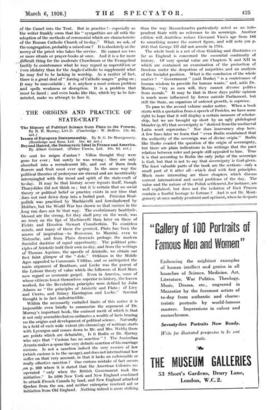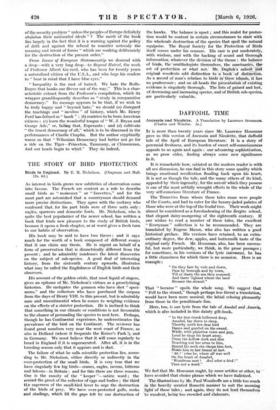• THE ORIGINS AND PRACTICE OF STATE-CRAFT
• Issues of European Statesmanship. By B. G. De Montgomery. (Routledge and Sons, Ltd. 10e. 6d. net.)
Beyond Hatred, the Democratic Ideal in France and America.
By Albert Guerard. (Fisher Unwin, Ltd. 10s. 6d. net.) Ou sont les neiges d'antan ? Villon thought they were gone for ever ; but surely he was wrong : they are only absorbed into a recrudescent life, and out of them fresh flowers and fruit must ever spring. In the same way the political theories of yesteryear are eternal and are inextricably intermingled with the trend and spirit of the state-craft of to-day. It may be that historynever repeats itself, though Thucydides did not think so ; but it is certain that no social theory or political belief or practice exists in our time that does not root down deep into a buried past. Prnisian Real- politik was practised by Machiavelli and foreshadowed by Hobbes, but the World War has shoWn us that success in the long run does not lie that way. . The evolutionary beatitude.
th
blessed .are the strong, for they shall prey on the weak, was no truer on the lips of "Machiavelli than later on those of Fichte and Houston Stewart Chamberlain. To countless minds, and many of thoie the greatesi, Plato has been the source of inipirationto Rousseau, to . Mazzini, even to Nietzsche, and from Plato descends perhaPE the Modern Socialist doctrine of equal opportunity. , The political ,prin- ciples.of Aristotle hold their own to-day, and from the writings of Thomas Aquinas, the apostle of Aristotle, we obtain our , first faint glimpse of the " dole." Ockham in the Middle Ages appealed to Communis Utilitas, and so anticipated the main argument of Bentham, and Locke was the parent of the Labour theory of value which the followers of Karl Marx now regard as economic gospel. Even in America, some of whose citizens boast themselves superior to history, the leaven worked, for the Revolution principles were defined by John Adams as " the principles of Aristotle and Plato ; of Livv . and Cicero, and Sidney Harrington and Locke." Seminal thought is in fact indestructible. Within the necessarily curtailed limits of this notice it is impossible even briefly to summarize the argument of Dr. Murray's important book, the eminent merit of which is that it not only assembles but co-ordinates a wealth of facts bearing . on the origins and development of political science. Naturally in a field of such wide extent (its chronology of writings ;starts with Lycurgus and comes down to Mr. and Mrs. Webb), there are points which are debatable..., Is it Bodin or Dr. nurray who says that " Custom has no sanction " ? The Australian Arunta makes a spear the very definite sanction of his marriage custom. Is not a sanction indeed the very , essence of law (which custom is to the savage), and does not international law . suffer on that very account, in that it lacks an enforceable or really effective sanction ? One curious mistake of fact occurs on p. 269 where it is stated that the American Colonies co- operated " only when the British Government took the initiative." In 1690 New York and New England combined :to attack French Canada by land, and New England attacked Quebec from the sea, and neither enterprise received aid or initiation from Old England. Nothing indeed is more striking than the way Massachusetts particularly acted as an inde- pendent State with no reference to its sovereign. Another edition will doubtless reduce Giovanni Vico's age from 188 to something nearer the correct figure, and will note (on p. 284) that George III did not accede in 1764.
The whole book is a net of close thinking and illustrates Ea far as England is concerned the esssential continuity of history. Of very special value are Chapters X and XII in which are contained an examination of the protection of 'freedom under the despotism of majorities and an analysis of the Socialist position. What is the conclusion of the whole matter ? " Government " (said Burke) " is a contrivance of human wisdom to provide for human wants," and, adds Dr. Murray, " try as men will, they cannot divorce politica from morals." It may be that in these days public opinion is much more influenced by forces outside Parliament, but still the State, an organism of ordered growth, is supreme.
To pass to the second volume under notice. When a book starts with a quotation from a speech of Pericles, we have some right to hope that it will display a certain measure of scholar- ship, but we are brought up short by an ugly philological blunder (p.97) that sovereignty is " derived from the mediaeval Latin word supremitas." Nor does "inaccuracy stop here. A few lines later we learn that " even Bodin maintained that the authority of the sovereign was of divine origin." Bodin 'like Burke evaded the question of the origin of sovereignty, but there are plain indications in his writings that the pact relation between ruler and people still appealed to him. True it is that according to Bodin the only judge of the sovereign is God, but that is not to say that sovereignty-is God-giyen. The least valuable parts of the book are the sections—only a small part of it after all—which deal with first principles. Much more interesting are those chapters which discuss current international and social problems of the day. The value and the nature of the Polish settlement, for instance, are well explained, but does not the isolation of East Prussia contain a fearful hostage to fortune y And is not pr. Mont- gomery at once unduly pessimist and optimist, when he 'despairs
of the security problem " unless the peoples of Europe definitely abandon their nationalist ideals " ? The 'merit of 'the book lie; largely in the fact that it is a warning against the policy of drift and against the refusal to consider seriously the meaning and intent of forces " which are working deliberately for the destruction of the present order."
From Issues of European Statesmanship we descend with a drop—with a very long drop=to Beyond Hatred, the work of Professor Albert GuZrard, who has been for twenty years a naturalized citizen of the U.S.A., and who begs his readers to " bear in mind that I have blue eyes."
" Inequality is the root of hatred. We hate the Rolls- Royce that honks our flivver out of the way," This is a char- acteristic extract from the Professor's compilation, which its wrapper grandiloquently describes as " study in comparative democracy." Its message appears to be that, if we wish to be truly happy and " beyond hate," we should (a) disregard the Jeachings and " incubus " of history, which Mr. Henry Ford has defined as " hunk " ; (b) contrive to be born American citizens ; (c) learn the wonderful tongue of " W. J. Bryan and George Ade," or, failing that, Esperanto ; and (d) cultivate " the truest democracy of all," which is to be discerned in the performances of Charlie Chaplin. But the author cryptically warns us that " Wilsonian Democracy had better not go for a ride on the Tiger—Princeton, Tammany, or Clemenceau. And our heads begin to whirl." They do indeed;







































































 Previous page
Previous page